Monday Feb 16, 2026
Monday Feb 16, 2026
Thursday, 25 November 2021 00:30 - - {{hitsCtrl.values.hits}}
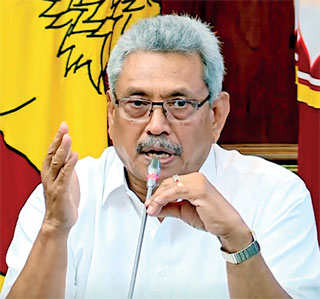
President Gotabaya Rajapaksa
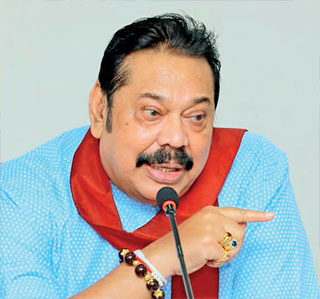
Prime Minister Mahinda Rajapaksa
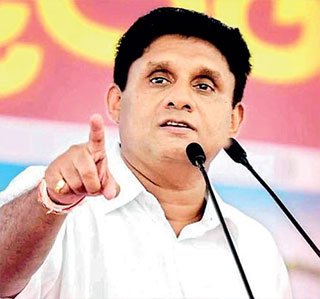
SJB Leader Sajith Premadasa
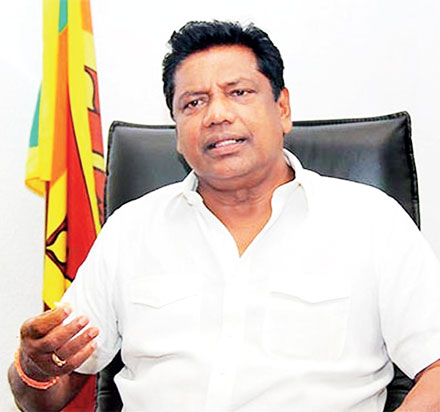
SJB MP Kumara Welgama
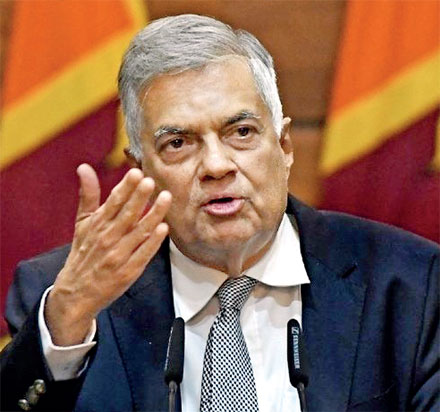
UNP Leader Ranil Wickremesinghe
|
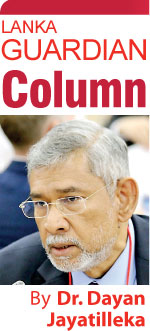 For decades, the UNP and (until 1977) the Left held the multiethnic cities; the SLFP, the Sinhala countryside. The SLPP did even better than the SLFP. Today, with one nuclear ‘policy bomb’ the epicentre of which is paddy cultivation, President Gotabaya Rajapaksa has erased that political map. The SLPP is almost certainly shattered in the countryside, doomed in the cities. Prime Minister Modi set a healthy example of leadership by addressing the nation, pledging to repeal the three pieces of legislation that India’s peasantry was mounting massive demonstrations against including in Delhi itself. Modi, the leader of the world’s most populous democracy and a Big Power, is a respected international figure. Instead of following his example, addressing the nation and rescinding his grotesque fertiliser policy, President Gotabaya Rajapaksa had a convoluted, testy televised session with his officials, giving confusing (and confused) signals, but no substantive change of a policy clearly making for national socioeconomic catastrophe.
For decades, the UNP and (until 1977) the Left held the multiethnic cities; the SLFP, the Sinhala countryside. The SLPP did even better than the SLFP. Today, with one nuclear ‘policy bomb’ the epicentre of which is paddy cultivation, President Gotabaya Rajapaksa has erased that political map. The SLPP is almost certainly shattered in the countryside, doomed in the cities. Prime Minister Modi set a healthy example of leadership by addressing the nation, pledging to repeal the three pieces of legislation that India’s peasantry was mounting massive demonstrations against including in Delhi itself. Modi, the leader of the world’s most populous democracy and a Big Power, is a respected international figure. Instead of following his example, addressing the nation and rescinding his grotesque fertiliser policy, President Gotabaya Rajapaksa had a convoluted, testy televised session with his officials, giving confusing (and confused) signals, but no substantive change of a policy clearly making for national socioeconomic catastrophe.
Mandate
After a rant against ‘specialists’ and an accusation that the State’s administrative ‘structures’ were linked to fertiliser corporates, President GR upbraided the ministerial Secretary for a subversive deviation from presidential policy, and declared that henceforth, only those farmers using organic fertiliser would be entitled to subsidies. That sounds discriminatory to me.
Two years ago, GR was elected President by a margin of 10% over the current Leader of the Opposition Sajith Premadasa who missed the magic 50+% mark by 8% while his party was in freefall. Had the peasantry known that the Pohottuwa candidate would go back on the pledge in his manifesto that the conversion to organic fertiliser would be spread over a decade (“dasakaya”), and would instead implement it overnight, would they have voted as a bloc for him?
Since President GR has unilaterally departed from an election pledge on a fundamental issue, causing great economic damage and social suffering, thereby tearing a hole in the social contract, how much of his mandate has he forfeited, and what rights of redress and recall revert to the sovereign people, the citizenry, in consequence?
Welgama
Kumara Welgama’s latest outburst was one of the most liberating things that have happened in the recent past, because he spoke not so much the unspoken, but articulated in Parliament—and therefore on primetime television news—what is being spoken in the public square: “these guys are nuts!” (“munta pissu!”). Sometimes it’s said in the singular, which is itself a singular presidential achievement, noted Welgama.
He had a sideswipe at some in the current Opposition reminding them of their wrongdoings when they were with the UNP; wrongdoings of which he was himself a target. A veteran political warrior who fought under the leaderships of Sirimavo and Mahinda, he commended Sajith as a credible claimant of presidential candidacy while expressing bemused condescension about some ex-Team Ranil UNPers, who could only dish it (political persecution) out but weren’t tough enough to take it. Having ridden with Presidents Ranasinghe Premadasa and Mahinda Rajapaksa myself, I get where he’s coming from.
What Welgama shed light on but did not actually define, was that the current crisis is not limited to one administration but at least two, the Gotabaya/Pohottuwa and the predecessor Yahapalanaya/UNP.
The critiques the Government and Opposition levelled at each other in the Budget debate were pretty much true. Putting the two together helps grasp the totality. That point isn’t vitiated by the anomaly that the Government’s critique was dated: it was attacking the UNP government’s policies, when there was no elected UNP seated opposite, only the SJB, a new party founded and led by a UNP dissident-turned-rebel.
Crisis
The economic crisis must be seen as a single one dating back to 2015. Those who note with complete accuracy that President Gotabaya Rajapaksa and the Pohottuwa administration have lost more popularity more rapidly than any leader and governing party Sri Lanka has had since Independence, choose to forget that the previous Yahapalanaya administration consisting of the UNP and a faction of the SLFP, lost popularity faster than any government had until then.
The infant SLPP led by Mahinda Rajapaksa who was not even the Leader of the Opposition (though he led the largest segment of it), defeated both UNP and SLFP at the Local Authorities Election of February 2015, a mere three years after they took office. Usually, the citizenry holds its collective nose and votes at a Local Government Election for whoever is in office, because it would guarantee the flow of funds to the municipal level. Not so in 2018.
What this clearly shows is that two successive governments since 2015 lost popularity at a historically unprecedented rate, with the latter—the Pohottuwa administration—losing it faster. What that proves in turn, is that there has been since 2015, a single crisis which is accelerating in its second stage due to the utter irrationality of the policies of President Gotabaya Rajapaksa.
UNP-SLPP
It is not merely a Pohottuwa crisis; it is a Yahapalanaya-Pohottuwa crisis, a Ranil-Gotabaya crisis, with the latter phase far worse than the former. If anyone thinks that’s an improbable hyphenation, it should be recalled that both Ranil and GR always identified with the US Republicans in their neoconservative and Alt-Right phases: George W Bush and Donald Trump respectively.
While the second Mahinda Rajapaksa term had some ghastly mistakes in the realms of governance and diplomacy, in economics Sri Lanka had the second highest growth-rate in Asia, after China. Loans were taken from China, but that’s where the surplus capital was, and the infrastructure buildup had been necessary for decades. The growth rate enabled that administration to meet the loan repayments with little problem.
The compost hit the fan when the UNP side of Yahapalanaya, which was managing the economy and external affairs, ripped-off the Central Bank and arrogantly pulled the plug on the Chinese projects in 2015. The economy lost momentum, people weren’t working, bills had to be paid. Having started off with the Yahapalanaya UNP Foreign Minister dissing the Chinese at a presser at our embassy in Beijing, the UNP ended up handing Hambantota over to the Chinese for a longer period and with a larger extent of real estate than Mahinda Rajapaksa had.
In 2015 the UNP ignored the advice of Nobel Prize-winner Joe Stiglitz, that post-conflict economic recovery in Sri Lanka should commence with greater equity.
The Gotabaya administration took over in late 2019, and its own whacko policies, much more off-centre than even the Yahapalanaya UNP’s, were installed. These were the autarchic Jathika Arthikaya (National Economy) policies of the ultranationalists, entailing a return to the harsh doctrines of import bans of the Sirimavo Bandaranaike-NM Perera years. These have predictably proved so destructive (e.g., local confectionary manufacturers are pondering relocation) that the Jathika Arthikya is increasingly also a Vijathika Arthikaya (non-national economy) with the fire-sale of real estate and national assets.
System
There was an underlying commonality in the two stages of the crisis: 2015-2019 and 2019-to-date: the absurd attitude on the part of the Yahapalanaya UNP and the Gotabaya presidency that they had been elected to make a ‘revolution’ of some sort; a ‘system-change’. Both administrations were certainly elected to make a change, but this was to make things better, not worse. The mandate was for reform, for improvement, for building upon, not ‘revolution’ or ‘counterrevolution’.
The system didn’t fail from 1948, or if you prefer to calculate from the Presidential system/Open Economy, from 1978. It successfully got us through thirty years of war in the North, two insurrections in the South and one episode of foreign intervention. It did so with an average of 5% economic growth in wartime while ensuring a measure of social welfare. It kept democracy going in its fundamentals.
What was wrong with the system only required course corrections, policy shifts and structural reforms. The 18th Amendment was wrong, bad, but could easily have been rectified. Instead, the Yahapalanaya UNP tried with its original 19A draft to transfer the powers of a directly and nationally elected President, to a parochially elected Prime Minister who had a grip on his own party by altering the party Constitution so it had a greater concentration of power than did the country’s.
The Supreme Court tossed back the 19A draft as requiring referenda. The attempt itself ended any relationship of trust between the UNP Prime Minister and the SLFP President. Failing to learn the lesson of the verdict, the Yahapalanaya UNP attempted a new Constitution which would abolish both the presidency and the unitary state form—even after it had been beaten by the infant SLPP at the Local Authorities election of February 2018.
The ethnic question could only accommodate as a resolution, the full implementation of the 13th Amendment, making the system of Provincial Councils more fully functional. Instead, the Tamil parties wanted a starting point beyond the 13th Amendment, the UNP agreed to a non-unitary Constitutional draft and we are now looking at a new Constitution without 13A and only minimal devolution.
The UNHRC Geneva needed only the implementation of the recommendations of the three Presidential commissions—LLRC, Udalagama and Paranagama—but this option was eschewed by both the Ranil-Mangala UNP which wanted “foreign judges, prosecutors and special counsel”, and the Gotabaya administration, which wanted zero-accountability.
Endgame
In July 2018, I proposed that Chamal Rajapaksa (Lessons of Mexico's left populism and the case for Chamal as JO candidate – https://www.colombotelegraph.com/index.php/lessons-of-mexicos-left-populism-the-case-for-chamal-as-jo-candidate/), or Dinesh Gunawardena be the candidate instead of Gotabaya (Why not Dinesh Gunawardena? – https://www.ft.lk/columns/Why-not-Dinesh-Gunawardena-/4-659526), whom I had suggested in Dec 2016 through 2017 as a proxy candidate for MR.
My urging of Chamal or Dinesh was a year-and-half before the Presidential Election of 2019. If there ever was a chance of that happening, it got blown away with the Easter Sunday bombings of April 2019.
Conspiracy theories apart, here are the “known knowns”:
1. Ven Gnanasara and the BBS were spouting violent Islamophobic rhetoric from 2012, years before Zahran and Co. became terrorists, and the Easter Commission report reportedly urges prosecution, drawing attention to the former’s provocative role in creating the atmosphere for the radicalisation of Islamic youth.
2. As Secretary/Defence, Gotabaya Rajapaksa spoke approvingly at the political academy of the BBS, and defended the Gnanasara/BBS line in a Daily Mirror interview.
3. A decade later, President Gotabaya Rajapaksa picked the conspicuously non-scholarly Ven. Gnanasara out of tens of thousands of monks, to head a Presidential Task Force on the sensitive issue of One Country, One Law.
This demonstrates an abiding affinity, at the least.
If Gotabaya Rajapaksa’s candidacy was sealed by the Easter bombings and its ‘national security/law and order’ backlash, his victory was ensured by the fact that the UNP, though it had been overrun electorally in February 2018 and clearly needed a new leadership and candidacy, stalled the choice of Sajith Premadasa until Gotabaya had done several campaign laps. When Ranil belatedly did nominate Sajith, the candidate wasn’t given the party leadership unlike Ranasinghe Premadasa in 1988. During Sajith’s campaign, Ranil insisted he would be PM and Mangala said the MCC would be signed. That’s how GR won and we got here.
|
JVP
If it’s one bipartisan crisis, Yahapalanaya-Pohottuwa, why not opt for the JVP-NFF as the solution? Because it is not.
Where the need is for a change of policy paradigm and of structure but not of system, the JVP thinks the problem is “system-failure” and calls for “systemic change”. That’s throwing the baby and the bath-tub out with the bath-water.
The JVP will overshoot the mark just as or more than Gotabaya and Ranil did, albeit in a different direction. I arrive at this conclusion from the following key ideas of the JVP revealed in the 13 November speech by Gen-Secretary Tilvin Silva, commemorating the 32nd anniversary of Wijeweera and party activists who died in 1989:
Last year on the same occasion, Tilvin Silva listed the 13th Amendment as emanating from the Indo-Lanka accord and part of his justification for the barbaric violence perpetrated by the JVP in 1988-’89. He did not offer an alternative solution based on autonomy of any kind. (Tilvin Silva | 13 November 2020 - YouTube – https://www.youtube.com/watch?v=EP6dau245kM)
Solution?
Why exempt Sajith Premadasa from the twin paradigms driving the single, overarching crisis of Yahapalanaya-Pohottuwa? For much the same reason that his father was not held culpable for the gross errors of the Jayewardene era but recognised as a dissident and alternative-in-waiting. Sajith was perceived a populist-developmentalist, not an adherent of Ranil’s neoliberal paradigm or part of Team Ranil.
MS told me that Sajith’s palpable disapproval in Cabinet during Ranil’s neoliberal excesses on domestic and foreign policy (e.g., Geneva 2015 and ‘foreign judges’); his paternally inherited position on national sovereignty and people’s welfare, made it clear to MS as a veteran politician from the grassroots, that only a partnership with Sajith as PM from the UNP camp could re-balance the Yahapalanaya equation and governmental policies, constructing a moderate-centrism, sustaining bipartisan ‘cohabitation’ and constricting the space for the gathering ultranationalist backlash.
Sajith has publicly disclosed, and President Sirisena confirmed to me, that he was repeatedly invited to take over the Premiership. Premadasa declined just as he did President MR’s wartime invitation which Karu Jayasuriya (understandably) accepted.
What the country needs is a party, a leader and a project for a new policy paradigm and structural reform within the democratic/republican/presidential/open economic system that has worked for us however imperfectly. We need a political project to build the super-highway we really need: a Middle Path for the 21st century.
What Sri Lanka hasn’t tried are:
(A) Social Democracy (New Zealand, Germany, Norway).
(B) Progressive-centrist Liberal Democracy (Biden and his neo-Rooseveltian social spending plan; Macron and his return to ‘planning’).
(C) Left Populism (Mexico’s Lopez Obrador).
These three options are clearly on a continuum and can blend or be triangulated. In contemporary Sri Lanka the only leader I can see whose discourse actually situates him within that triangle, is Sajith Premadasa. His hour-long, ideas-packed oration in the Budget debate, delivered on 22 November 2021 (https://youtu.be/OrB70iQVG5A) demonstrated a rare combination of a cool head, a warm heart, and a moral-ethical combativity in a statesmanlike stance, explicitly eschewing both neoliberal free-market fundamentalism and extreme socialism, while no less explicitly opting for social democracy.